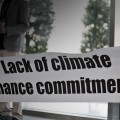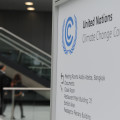Bonn: Rebranding the Old
Jayden Holmes | June 2, 2015.
With negotiating groups working diligently on condensing the Geneva text, the big news for day two of the United Nations Framework Convention on Climate Change (UNFCCC) climate change conference in Bonn came from Japan.
Global attention turned to Japan as the government approved its draft Intended Nationally Determined Contribution (INDC) which will be formally presented at this weekend’s G7 meeting. A draft INDC which, by all accounts, is disappointing.
It is understood that Japan intends to reduce greenhouse emission by 26% by 2030 compared with 2013 levels; equating to a mere 18% reduction from 1990. Rather than achieving this target via renewables, Japan plans to meet much of its future energy needs through the use of nuclear power.
Japan is not the only country defining their own greenhouse gas base years, according to which is most favourable. Common baselines must be adopted in individual INDCs, and in the Paris agreement, to allow for transparent comparison of country ambition.
Civil society representatives are disappointed to see Japan, who holds a symbolic leadership role in the international climate regime, participate in these negotiations without the drive that fostered the adoption of the Kyoto Protocol in 1997.
The Intergovernmental Panel on Climate Change’s (IPCC) Fifth Assessment Report, published in 2014, scientifically demonstrates that a greenhouse gas emission reduction of between 40 and 70 per cent by 2050 (compared with 2010) is needed to keep warming below 2°C. Japan’s draft INDC needs to be more ambitious to align with the 2°C “guardrail” target set in Copenhagen.
Tuesday also saw the final presentation of the Structured Expert Dialogue (SED) on 2013-15 UNFCCC Review question whether the current guardrail target is actually sufficient.
The SED found that—not only is the world off-track to keep global warming below 2°C—the upper limit goal should actually be reset to 1.5°C, as originally outlined under the convention. Part of the agenda in Bonn will be taken up with countries discussing whether they should readopt this more ambitious long-term goal.
Within the negotiations, the ever-decreasing focus on climate change education was evident as discussion turned to climate change education at the 3rd dialogue on Article 6 of the convention.
Along with expert calls for climate education to be better aligned with the Sustainable Development Goals, UNFCCC Executive Secretary Christiana Figueres suggested that Article 6 should be renamed in a way that “makes sense”. However, the purpose of re-branding Article 6 is as unclear as what its future will be post-2020, when the Doha work programme is scheduled for review. It doesn’t quite make sense.
Education is essential for the successful implementation of climate change action. As put by the founding director of the Centre for Environment Education (CEE), Kartikeya Sarabhai: “If we are to reduce emissions and improve adaptation, education is a tool to make that happen”.
It is important that climate education is included in a cross-cutting manner within the Paris agreement. More than just a name change is required.
The Verb will be on the ground in Bonn to cover the UN climate change conference as it unfolds over 1-11 June 2015. For those in Bonn, the dialogue on Article 6 will continue on June 3 2015 in the Addis Abeba room, with a focus on training on international issues.













comment